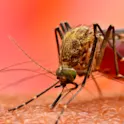Monica Malta – The quiet architecture of violence: Why LGBTQ+ health demands community ownership
Dr Monica Malta is an Assistant Professor at the School of Global Health at York University, a TED speaker, and a human rights advocate with over 15 years of experience in global health research. Her work focuses on the social and structural determinants of health and gender inequities, with a strong emphasis on 2SLGBTQ+ communities - particularly female-identified, queer, and gender-diverse people - as well as people living with HIV, sex workers, and people who use drugs across the Global South. Grounded in community-based participatory research, Monica works alongside communities to document harm, shift power in research and policy, and co-create responses that improve safety and well-being. She is also the co-designer of the RISE Dandara app, a community-led digital tool that supports 2SLGBTQ+ people to report violence, access trusted resources, and strengthen collective protection.
In recognition of International Human Rights Day, and in the spirit of the United Nations Sustainable Development Goals, particularly SDG 3: Good Health and Well-Being and SDG 10: Reduced Inequalities, Monica joined us for a conversation about power, resistance, and justice in global health.












